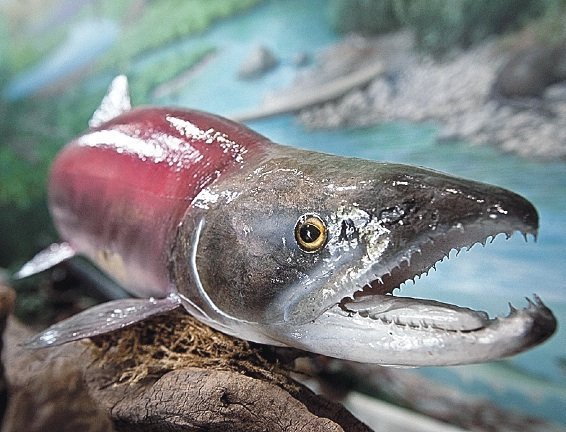forum
library
tutorial
contact

Saving Salmon is
Now an Industry
by John Webster
Spokesman-Review, August 4, 1996
|
the film forum library tutorial contact |

|
Saving Salmon is
by John Webster
|
If rates rise too dramatically, the BPA's industrial customers will
leave the region or switch to competing private power providers.
 Once upon a time, the U.S. Postal Service was the poster child for governmental ineptitude. Then came welfare, the kindly narcotic that helped make a social wasteland of America's inner cities. And here in the Northwest, who could imagine bigger bungles that the abandoned nuclear plants of the Washington Public Power Supply System or the billions squandered on lawyers and studies in the name of cleaning up still-contaminated Hanford?
Once upon a time, the U.S. Postal Service was the poster child for governmental ineptitude. Then came welfare, the kindly narcotic that helped make a social wasteland of America's inner cities. And here in the Northwest, who could imagine bigger bungles that the abandoned nuclear plants of the Washington Public Power Supply System or the billions squandered on lawyers and studies in the name of cleaning up still-contaminated Hanford?
But now comes a scandal uniquely painful for the Northwest, because it involves so many aspects of our economic and environmental heritage: Our region's electricity ratepayers have forked over nearly $3 billion to save wild salmon runs, yet many runs are nearly gone. Meanwhile, a banquet table piled high with loosely monitored dollars provides an orgiastic feast for biologists, engineers, hatcheries, construction firms, regulation-writers, fisheries police, agencies, lawyers and the producers of long-winded studies.
Salmon-saving is an industry, a political cause celebre, a basis for interest-group fund raising and a discouraging failure.
No one symbolizes this better than Lonesome Larry, the stuffed sockeye who may have been about the last of the Redfish Lake run for which huge sums still are being spent. Part of the problem is the Endangered Species Act, which spawns spending, litigating and political polarization in a panicky atmosphere that stifles critical accounting and methodical science.
Help for salmon runs requires controversial change on so many fronts - logging, farming, dams, hatcheries, fishing regulations and irrigation - that common sense suggests funding should go mainly to runs with a chance of recovery, more than runs for which help seems too late. But that's not how current law works.
Furthermore, as Lynda Mapes of the Spokesman-Review showed in her "River of No Return" series, there is a crying need for independent science and accounting.
But the groups that spend salmon recovery dollars often determine how much of the public's money they receive. No wonder some projects keep collecting millions after they are known to be a failure. Some projects aren't even audited to determine if they work or where the money goes; the dollars keep flowing, fish keep floundering. Sen. Slade Gorton's bill establishing independent scientific review of projects should help that problem.
So might legislation to clarify who, among the several entities with competing salmon rescue plans, is in charge. When that's done - and we'd prefer a regionally accountable agency such as the Northwest Power Planning Council - Congress should order routine performance audits and other standard practices of responsible accounting. This would improve the odds that wild fish, rather than wild spenders, come out winners.
Related Pages:
Saving The Salmon Isn't All Or Nothing by John Webster, Spokesman-Review, 3/29/95
learn more on topics covered in the film
see the video
read the script
learn the songs
discussion forum
